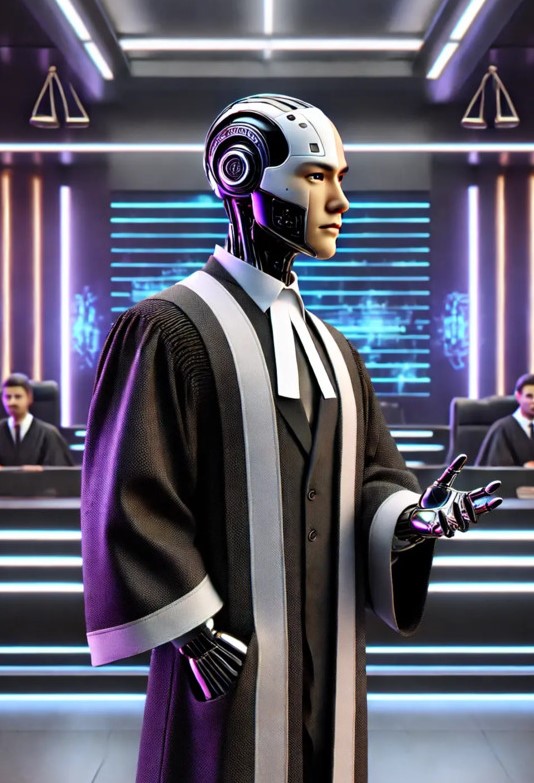A Decade of Innovatus – On Tomorrow’s Lawyers
Since 2014, the close of each year has seen our partners pen their commentary – a reflection of our accomplishments, laced with hopes for the days ahead. These musings, perhaps, held whispers of routine or shades of business promotion. Yet, as we stand at the milestone of our firm’s tenth anniversary, it feels fitting to turn our gaze outward and ponder the role of lawyers in a world yet to come.

Over the past decade, a shared memory among all of us might be the dizzying pace at which the world has transformed. From the Internet of Things, social media platforms, and the sharing economy, to electronic payments, electric vehicles and solar energy, blockchain and cryptocurrencies, quantum computing, and artificial intelligence—rapid technological change has not only generated immense wealth but also left gasping for breath as if caught in a hairpin turn. For the new generation, the “almost artisanal” nature of legal work holds little allure, while seasoned veterans may lament being left behind by the march of time. If ChatGPT can deliver seemingly polished answers in mere seconds, should future legal professionals pivot to new careers or simply lie back, converting their savings into TSMC or Nvidia stocks for a more practical bet? The answer lies in how we perceive the true value of this profession.
The Value of Legal Professionals – Judgement and Choices in Hard Cases
The renowned sci-fi author Isaac Asimov’s novel I, Robot and its film adaptation feel strikingly real in today’s world, decades after their creation. It’s not just the level of technology depicted in the movie—rapid advancements in artificial intelligence and humanoid robotics in the real world seem to be catching up. The movie’s portrayal of USR as a monolithic company controlling global wealth, communications, and even national security doesn’t feel far-fetched when compared to figures like Elon Musk today. While current AI primarily engages in conversational logic akin to a “fill-in-the-blank” game, more advanced reasoning models—ones capable of creativity and emotional simulation—seem to be just a matter of time. According to Goldman Sachs, legal professions rank among the top jobs at risk of being replaced. On this point, I agree—if we fail to understand the core value of legal work.
If future legal professionals still believe their fees are justified by their bar licenses or judicial prestige and pride themselves on their encyclopedic recall of laws like a walking statute book, they will likely find themselves outmatched by powerful AI. However, if we reflect deeply on Isaac Asimov’s famous “Three Laws of Robotics” (the laws being: A robot may not injure a human being or, through inaction, allow a human being to come to harm (i.e., a robot must protect the human being); a robot must obey the orders given it by human beings except where such orders would conflict with the First Law; a robot must protect its own existence as long as such protection does not conflict with the First or Second Law), we may chuckle and realize that the world still has room for us. Since AI ultimately operates within the framework of instructions programmed by humans, legal professionals can find their value in interpreting, navigating, and shaping these principles and rules.
Since robots must ultimately be programmed with the Three Laws of Robotics, the questions that legal professionals of the future can still raise include: What constitutes “harm”? What does it mean to “protect”? To prevent humanity from descending into chaos and conflict, would raising all human beings in captivity be the ultimate human welfare? These questions, debated since the time of Jeremy Bentham, remain contentious even in the absence of artificial intelligence—and likely will always be worth revisiting. Fortunately, the emergence of AI offers an opportunity for future legal professionals to shift their focus from rote memorization of “statutes” to the intellectually demanding task of interpreting “principles and rules.” By understanding the judgments of value underpinning every regulation, they can devote themselves to tackling hard cases where answers are far from obvious. The work of tomorrow’s lawyers may be more taxing, but their intellectual growth will be significantly enriched.
For example, the statutory language of self-defense is deceptively simple: “A conduct performed by a person in defense of his own rights or the rights of another against immediate unlawful aggression” An AI could, in mere seconds, locate the relevant legal provision and even conduct an analysis of its elements. However, what factual circumstances meet the standard of “immediate unlawful aggression”? Consider a scenario where a wife, who has endured repeated sexual assault and domestic violence, stabs her husband to death while he is asleep. Does this act constitute self-defense against an “immediate”unlawful aggression? If not, what realistic options for self-defense remain once he is awake? This question, unresolved even in the wake of the case of Deng Ru-Wen in 1993, continues to divide human society—let alone artificial intelligence. Casting aside the arrogance of mere textual memorization, the true battlefield for future legal professionals lies in applying sound judgment to uphold fairness and justice.
The Future of Corporate Lawyers: Decoding the Legal Codes Behind Wealth
Returning to the heart of our profession, let us turn our gaze to the future of corporate lawyers. If you are still peddling thick “Due Diligence Reports” and lamenting their reluctance to value your expertise, consider this: you may soon find yourself a fossil dinosaur. In the world to come, much of the manual work performed by lawyers will be supplanted by automation. Yet, fortunately, Professor Katharina Pistor of Columbia Law School has illuminated a path forward for business lawyers—one that involves transforming natural “resources” into “capital” in the business world through the art of legal coding.
Let us begin with a simple thought. Without a legal system to affirm ownership, no matter how long you or your ancestors have tilled the land or built on it, your house and crops will inevitably be razed under a court’s enforcement order. This was true for the Maya descendants in Belize, and for Taiwan’s indigenous peoples. Legal symbols, however, can recode a sum of capital, shaping virtual entities with either limited or unlimited liability to creditors. A loan with mortgage, originally a mere debt and credit relationship between borrower and bank, can be transformed—through the coding process of “asset securitization”—into a financial instrument, possessing the characteristics of real property, with the potential to create financial storms that are difficult to predict even for top analysts and supercomputers.
Human inventions and creations, too, can be transformed into commodities through intellectual property rights that can be legally capitalized, mortgaged, or traded. In the name of social justice and fairness, these creations may even be stripped of their commodified nature through mechanisms like “compulsory licensing” or “fair use.” If you are mesmerized by virtual currencies that bypass intermediaries and transcend borders in an instant, it is worth contemplating the very legal essence of “currency” itself, and the “unlimited legal tender” granted by the Central Bank Act. The process of coding natural resources into capital is akin to the codes that we instruct to artificial intelligence. This, I believe, is the timeless work of corporate lawyers—work that remains irreplaceable. If our discussion extends from future lawyers to future corporate lawyers, there is no need for pessimism. Instead, we can look forward to a renaissance of this profession, as it rises to new heights in an ever-evolving world.
A Decade to Sharpen a Sword: The Core Values and Future of Innovatus Law
I still remember vividly, back to 2014, when Jamie Yang and I stared across a small round table, nervously waiting for a phone call to start our entrepreneurial journey. Up to the present, we’ve been recognized for five consecutive years by the internationally renowned Legal 500 in various fields of practice, including dispute resolution, corporate mergers and acquisitions, intellectual property, and telecommunications technology – our journey has been both challenging and rewarding. This year, we were honored to become Taiwan’s only locally established business law firm to receive the prestigious Client Satisfaction Award (though we humbly acknowledge that two global firms with local branches also received this recognition). Yet, as a motto in the capital markets wisely remind us: past performance is no guarantee of future success. So, how do we view the challenges that lie ahead?
We believe that technological development will mark the end of labor-intensive work, and that the competitive landscape of corporate lawyers will move away from the assembly-line model, towards a realm that requires higher levels of intellectual engagement, rule innovation, and persuasive argumentation. In such an environment, the future of corporate lawyers does not merely lie in keeping pace with technological and industrial advancements, but in proactively guiding innovation, rather than passively applying technology. For example, how can we leverage our knowledge and experience in commercial transactions to design smarter, more reasonable, and enforceable smart contracts? Or, how can we, with our understanding of capital markets, create a safer platform for cryptocurrency exchanges? Furthermore, to assist our clients in navigating market competition, how can we address the argument that the entry of emerging industries promotes efficiency and creates wealth, rather than simply circumventing regulation or evading taxes? These focuses and directions have been clearly demonstrated in nearly 200 business law commentaries and over 300 public and private speeches we have delivered over the past decade. “A decade to sharpen a sword” – these insights and experiences are the foundation that equips us to deal with the challenges of the new world.
We are confident that innovation and exploration are the key to creating human wealth and well-being. This is our name, and also our mission.

Innovatus Law
Managing Partner
Dec. 31, 2024




Leave a Reply
Want to join the discussion?Feel free to contribute!